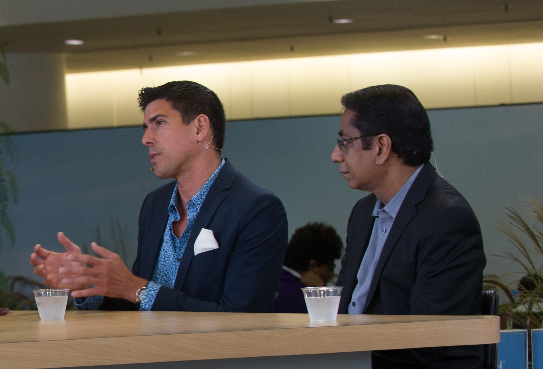
What is the fate of VMware Inc. virtual machines? Some tout containers (a virtualized method for running distributed applications) as their obvious successor — at least in modern cloud environments. But in real companies with a variety of applications, and Developer Operations (DevOps) teams, there may still be a place for both.
“This whole VM-versus-container debate, I think, really misses the point,” said Kit Colbert (pictured, left), vice president and chef technology officer of the Cloud Platform Business Unit at VMware. Companies and IT teams must consider the full picture of how they operate workloads in production, he said. This includes the three pillars: build, run and manage.
Kubernetes, the open-source container-orchestration platform, is still relatively young, he said. Its operational readiness for enterprises is not equal to that of VMware’s vSphere ecosystem for VMs, he argued. The latter’s enterprise-grade security, manageability and operational capabilities tend to win with operations teams. But some, more modern, applications, undoubtedly fare better in containers and Kubernetes.
Colbert and Krish Prasad (pictured, right), senior vice president and general manager of the Cloud Platform Business Unit at VMware, spoke with Dave Vellante (@dvellante) and John Furrier (@furrier), co-hosts of theCUBE, SiliconANGLE Media’s mobile livestreaming studio, during the VMworld event in San Francisco. They discussed VMware’s new vSphere/Kubernetes stack, Project Pacific (see the full interview with transcript here). (* Disclosure below.)
Give Kubernetes that old time vSphere ease of use
The fact is that most new workloads are still provisioned on VMs, according to Colbert. However, developers are famously smitten with Kubernetes and containers. Is it possible to bridge this gap over the already rough terrain that DevOps teams navigate?
VMware has introduced a “technical preview” of Project Pacific, which brings Kubernetes onto the vSphere cloud computing virtualization platform. It simplifies Kubernetes for companies that may be familiar with vSphere, but not yet experts on Kubernetes, according to Prasad. “With this one move, we have actually collapsed [both] back to one stack,” he said.
At the same time, operations teams and developers can take just what they want from it, and leave the rest. In other words, operations teams see just vSphere, if they choose, and developers see only Kubernetes. It provides a platform for new cloud-native containerized apps and more traditional VM-based ones.
Watch the complete video interview below, and be sure to check out more of SiliconANGLE’s and theCUBE’s coverage of the VMworld event. (* Disclosure: VMware Inc. sponsored this segment of theCUBE. Neither VMware nor other sponsors have editorial control over content on theCUBE or SiliconANGLE.)
Photo: SiliconANGLE
Since you’re here …
… We’d like to tell you about our mission and how you can help us fulfill it. SiliconANGLE Media Inc.’s business model is based on the intrinsic value of the content, not advertising. Unlike many online publications, we don’t have a paywall or run banner advertising, because we want to keep our journalism open, without influence or the need to chase traffic.The journalism, reporting and commentary on SiliconANGLE — along with live, unscripted video from our Silicon Valley studio and globe-trotting video teams at theCUBE — take a lot of hard work, time and money. Keeping the quality high requires the support of sponsors who are aligned with our vision of ad-free journalism content.
If you like the reporting, video interviews and other ad-free content here, please take a moment to check out a sample of the video content supported by our sponsors, tweet your support, and keep coming back to SiliconANGLE.